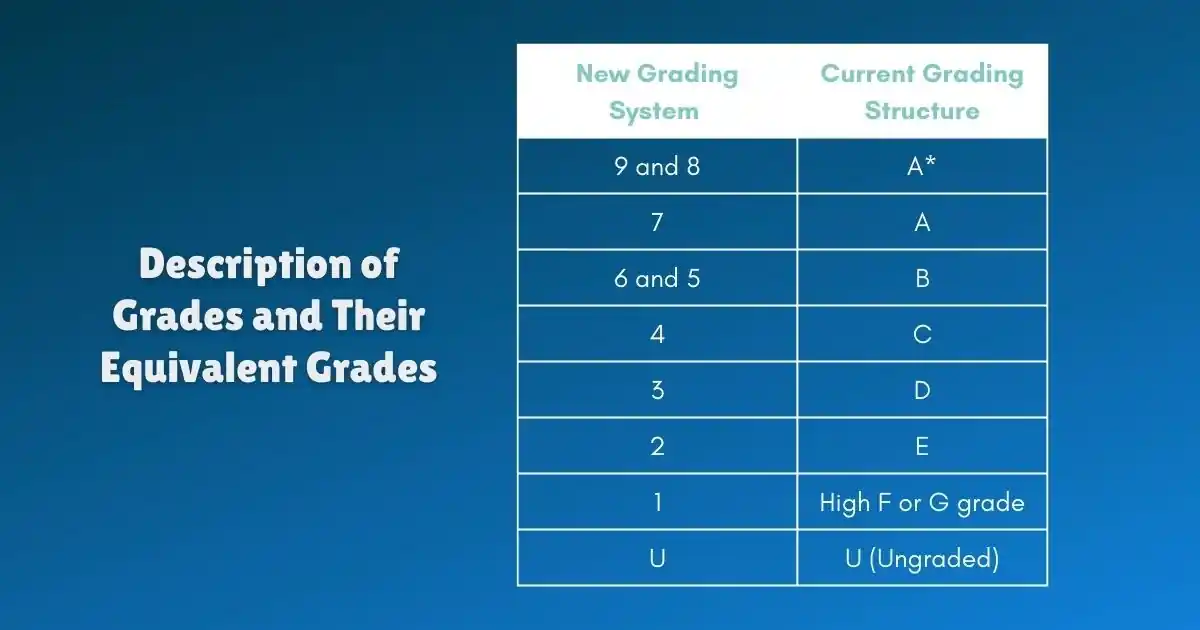How to Do a Hanging Indent in Word: Complete Guide for Students (2026)
Hanging Indent in Microsoft Word is a type of formatting style in which the first line of a paragraph has the left margi ...

Moving ahead to secondary education, you have to go through the General Certificate of Secondary Education (GCSE). GCSEs will help you get the subject you want for your future, which will even help you in your career. Start by understanding the new grading system for GCSE, which was updated in 2017. In the UK, everyone has to learn what the new GCSE grades are once they reach the 9th year of their education. GCSE, also famously known as the British or UK GCSE grading system, has 9 to 1 grades, each indicating your percentage.
This blog is full of information about the UK grading system, the New GCSEs, so that you can have complete information regarding what this is, which grade showcases what grades, what you can do when you have received unexpected results and many more things. GCSE grades 2025 will be explained in proper detail so that you can know where you stand and what your prospects are.
We have collected all the information from authentic sources, which include the UK government. wesbites, published articles, and even connected with professionals who provide homework help, as they made us talk with students, which helped us confirm that all the information we have is accurate.
If you want to learn what a GCSE pass is, let’s start by understanding GCSE grades, and for that, first, let’s go through its full form, that is General Certificate of Secondary Education, which is for years 10 and 11 of the UK curriculum. It's quite similar to the UK Uni Grading System, but it's just for school level. Usually, most of the students in the United Kingdom take the GCSE qualification when they leave compulsory education. A GCSE programme is available in traditional form and requires two years to complete before final exams. The programme is normally started by students when they are aged 14 and finished by them at the age of 16. There is nothing to learn more about the GCSE grades' meaning, other than that it is a grade system that shows your abilities.
GCSE is the internationally recognised high school qualification that opens doors to further studies in the UK. The GCSE subjects are wisely chosen depending on the academic results. The subjects that cycle GCSE students are 5 to 9 subjects, with compulsory subjects being maths and English. Although GCSE English grades and every subject grade are calculated in the same manner. The decision on the remaining subjects the students choose depends on what suits the student’s particular academic interests and strengths.
The most famous subjects selected by students are:
English literature and language
Chemistry, Physics or Biology
Economics
History
Geography
Business
Mathematics
And many more
A widely practised approach to education by independent boarding schools, such as Cherwell College Oxford, permits an individual approach to each student with every ability to bring out their potential.

The changes were introduced to bring the new, more challenging GCSE curriculum into line with the grading system and to give greater differentiation between students. Here’s the breakdown of the GCSE new grades.
| New Grades for GCSE 2025 | GCSE Equivalent Grades |
| 9 and 8 | A* |
| 7 | A |
| 6 and 5 | B |
| 4 | C |
| 3 | D |
| 2 | E |
| 1 | High F or G grade |
| U | U (Ungraded) |
Here is the GCSE grades 2025 explained, grade-wise. Each grade represents your intelligence and knowledge in your subject.
Grade 8: Very high achievement, just below Grade 9; roughly equivalent to an A*.
Grade 7: Strong performance, equivalent to the old B grade.
Grade 6: GCSE Grades 6 means Good performance, equivalent to a high B under the old system.
Grade 5: Known as a strong pass; equivalent to a low B.
Grade 4: Standard pass, C grade equivalent: the minimum required for most post-16 courses.
GCSE grades 3: Roughly equivalent to a D, and grade 3 would indicate a below-standard GCSE pass grade level.
Grade 2: Same as the old E grade and characterised by a lower level of achievement.
Grade 1: F and G grades are equivalent to the old F and G grades, representing minimal understanding of the concept.
U (Ungraded): An indication that the student failed to meet the qualification required to earn a grade.
Well, if I'm honest, it’s depressing getting an unexpected result, but rather than sitting and worrying about it. There are many things that you can do. It's quite common that you do not get the result you expect, but things don’t have to be ruled out. You have one easy way in which you can search "can someone do my homework for me online", to get help from professionals. Or you can take these proactive steps as follows:
Talk to Your School or College: If this is all, then make use of this chance to communicate with your school or college for help. The fact that they can help you to understand whether you can take an appeal on a grade, for example, or whether you can resit exams, or if you have spaces available, e.g. apprenticeship or vocational course.
Consider Resits: If you don’t get a grade 4 in English or maths, you will have to resit these subjects. However, you can resit in the autumn or the following summer and thus improve your grades.
Appealing the Results: Once you think that your exam papers have been wrongly marked, your school will usually be able to get a review or re-mark of them for you. There are deadlines to be aware of regarding the appeal of exams set by the exam boards.
Explore Alternative Pathways: If you cannot off enough grades to do the courses you want to do for A Levels or after college, then you should think beyond. According to some professionals who provide assignment help in London, they have helped so many students by making them focus on other skills, which include vocational qualifications, apprenticeships or other educational routes. It can also give you more time to think about what your GCSE options may be, and start, possibly, the path you want to mainly take within your career.
What does the actual meaning of the new GCSE grades mean? And how are GCSEs graded? Here’s a brief breakdown:
Grade 9-8: This is the top grade and reflects outstanding performance. The students only get this grade in a very small percentage of the time.
Grade 7: They were on par with the results of A grades under the old system, and are strong results.
Grade 6-5: Under the old system, these grades were equivalent to B grades and showed a good sort of performance.
Grades 4: These grades equate with the C grade under the new system and represent average performance. If you are thinking, "Is a 4 a pass in GCSE?" so the answer is simply yes.
Grades 3-2: Scores in these grades (also referred to as D-E grades under the old system) are the GCSE pass mark with some room for improvement.
Grade 1: This is the same as a High F or G, or the lowest grade and pass or fail.
However, you should emphasise that some subjects may have different grade boundaries, so it is always a good idea to confirm what the GCSE grades mean at your school or college.
Therefore, prospective university students always wonder whether GCSE results have any value in the admission process. The simple answer is yes; GCSE grades are very much taken into account when universities are accepting applications.
GCSE grades usually help an institution to know what other aspects a student achieved in other fields and his or her academic capacity.
GCSE grades are not the only factor that is looked at and are not the sole determinant for whether or not an applicant will be accepted or not; however, they are an important factor to take into account, especially for highly contested courses and universities.
This takes into consideration that students have to work hard and to the best of their abilities to get the best possible grades in GCSE to help shore up our university application and to increase the probability that we are accepted towards our chosen course.
During their recruitment process, employers may check GCSE results to authenticate a potential employee’s educational results and work suitability. But the level at which employers check GCSEs varies from sector to sector. However, some employers may be more focused on higher-level qualifications precisely linked to the role than others who will accept just standard English and maths GCSEs. They just have a look at GCSE grades in percentages and that's it.
In conclusion, the GCSE grade system is not that complicated. Once you have gone through this blog in proper detail, you will learn everything in proper detail. By going through this blog, you can learn many things, including what GCSE is and what the new grading system for GCSE is. Other than this, you have some guidance on what you can do when you have received an unexpected grade.
Once you have GCSE grades explained, you will be able to understand that grading system for GCSE is the same for every subject; no matter whether you are looking for the GCSE maths grading system or the English GCSE grading system, everything is the same for everyone. Lastly, we have even given an idea of does universities or employers check GCSEs, and the answer to this is yes, GCSE grades are seen by both employers and even in universities, when you are trying to get admission. So if you are not confident, it's okay if you pay someone to do your assignment UK.
There is no change in 2025 and 2024 grades; all the proportions are similar to last year. Even in the year 2025 we are returning to a more stable situation where the system of grading system is set to grade boundaries.
The new grading system starts from 1 and goes to 9, 1 being the lowest and 9 being the highest. You have different grade levels for all your percentages, except 9 and 8, they both represent A*, and 6 and 5 represents C grade.
21st of august 2025 is the date of result for this year, you will be allowed to collect your result from your school only, but it is suggested that you consult your school for this, as some school might look for posting results or send them directly to your through main, or messages so stay in touch with your school for this.
There are no such big changes, but a few changes involve 9 being the highest, also grade 9 can be achived only when your performacne is of extermely high quality other wise you have to compromise with a lower grade. Other than this bottom of grade 7 is similar to the old grade, and the bottom of grade 4 is comparable to old grade C.
Let's Book Your Work with Our Expert and Get High-Quality Content

Loved reading this Blog? Share your valuable thoughts in the comment section.
Add comment